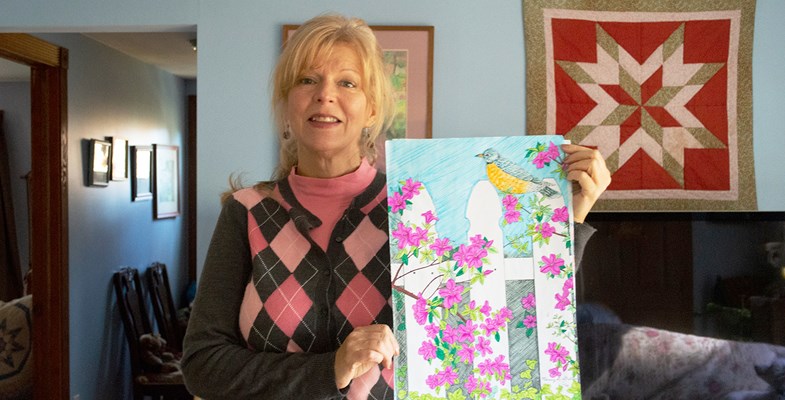Through therapy and a wonderful social worker from the facility, Nancy began to challenge all the negative, self-hatred thoughts that routinely entered her mind. First, she tapped her faith. Then she decided to start each day by making a list of 10 things she was grateful for. Every day, Nancy made a choice to focus on the positive, the things she could change, and how she could help others at the facility.
As an artist, she drew pictures for residents to hang as decoration for different seasons, and pictures that could easily be colored in for entertainment. Helping others at the facility became very therapeutic for Nancy as she was beginning to feel her sense of purpose again.
Nancy: “I like to help people. I made coloring sheets for people at the nursing home. I tried to make the scenes add to life, like a Christmas tree for someone who couldn’t have a real one, or a garden for someone who didn’t have a nice view. Now I want to bring these to other nursing homes.”
After many months of hard work and recovery, the facility social worker introduced Nancy to the Money Follows the Person (MFP) program. She applied, was accepted and began the process of finding a place to live and determining what services she would need. She soon had an apartment of her own, a budget to help buy personal care items and a SNAP card to buy groceries every month.
Nancy: “It’s hard when you have to live on a tight budget. I work hard to spend only what I have. Every now and then I’ll buy a treat or something for my son. I’m doing it.”
In addition, Nancy was set up with recovery assistants who would come to her home a few hours a day to help complete daily activities and provide rides for necessary and leisure activities. Before she eventually obtained a car, the assistants were Nancy’s only mode of transportation.
Since returning to the community, Nancy has continued to vigorously work on her happiness and takes each day as it comes. She continues to make her gratitude lists, focus on the positive, and challenge every negative thought that tries to seep in. She keeps busy by finishing art projects that she had started long ago, including intricate paintings and quilts. When the weather is nice, she loves spending time in her garden. One of the things she missed most while living in the nursing home was the freedom to do these things.
Nancy worked tremendously hard to turn her life around before she was introduced to MFP. The MFP program then gave her the opportunity to expand her success into the community. MFP perfectly supplemented Nancy’s “work hard” attitude – and she is grateful for how everything turned out.
Nancy: “I want to show my gratitude by helping others. As a way to give back, I want to find a nursing home where I can make life a little brighter with my drawings. Volunteering makes me nervous now, but I hope to find the courage.”

